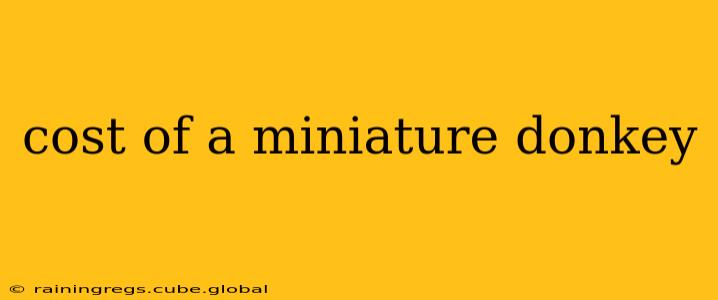Miniature donkeys, also known as miniature donkeys, are charming and increasingly popular companions. Their gentle nature, relatively low maintenance, and endearing appearance make them attractive additions to farms, ranches, and even some larger properties. However, before welcoming a miniature donkey into your life, it's crucial to understand the total cost of ownership. This goes far beyond the initial purchase price.
What is the average cost of a miniature donkey?
The price of a miniature donkey varies significantly depending on several factors. Generally, you can expect to pay anywhere from $500 to $5,000 or more. Several key factors influence the price:
- Breed: Some rare or highly sought-after breeds command higher prices. For instance, a registered miniature donkey with exceptional lineage might cost considerably more than a standard miniature donkey.
- Age: Younger miniature donkeys are generally more expensive than older ones. Foals (baby donkeys) are the priciest.
- Conformation and Bloodline: Donkeys with superior conformation (physical structure), desirable bloodlines, and show-quality traits will fetch higher prices.
- Location: Geographic location impacts cost. Areas with a higher demand for miniature donkeys or limited supply might have higher prices.
- Seller: Reputable breeders, known for their commitment to animal welfare and responsible breeding practices, typically charge more than less established sellers.
How much does it cost to care for a miniature donkey?
The ongoing cost of caring for a miniature donkey is a crucial aspect to consider. These costs can add up quickly, so careful budgeting is essential.
Annual Costs:
- Feed: This is a major expense. High-quality hay is essential, along with supplemental feed, especially for growing or pregnant donkeys. Expect to spend $500-$1500+ per year on feed alone. The exact amount will depend on the donkey's size, age, activity level, and the cost of feed in your area.
- Veterinary Care: Routine checkups, vaccinations, deworming, and potential unexpected illnesses can significantly impact the annual cost. Budget $500-$1000+ per year for veterinary care.
- Farrier: Miniature donkeys still need their hooves trimmed regularly by a farrier. Plan on $100-$300+ per year for farrier services.
- Housing and Fencing: Secure and appropriate housing, including shelter from the elements, is vital. Robust fencing is necessary to prevent escapes and protect your donkey. Initial costs for these can be substantial, ranging from a few hundred to several thousand dollars, but ongoing maintenance costs are typically less.
- Supplements and Miscellaneous: This covers things like mineral supplements, fly spray, grooming supplies, and any other necessary items. Expect to spend $100-$300+ per year.
What are the ongoing costs of owning a miniature donkey?
This encompasses all recurring expenses, including those mentioned above:
- Routine Healthcare: Preventative care is crucial to maintaining your donkey's health.
- Nutrition: Ensuring a balanced diet through quality hay and supplemental feeds is essential for their well-being.
- Shelter and Fencing Maintenance: Repairing or replacing fencing and ensuring proper shelter are ongoing responsibilities.
- Unexpected Veterinary Bills: Be prepared for unforeseen medical expenses.
Are miniature donkeys expensive to own?
While the initial purchase price might seem manageable, the ongoing costs of caring for a miniature donkey can be substantial. They require consistent care, proper nutrition, and veterinary attention. Therefore, it's not accurate to simply label them "expensive" or "inexpensive" without considering the long-term commitment and associated costs. A realistic budget encompassing all aspects of ownership is crucial before bringing one home.
What are the hidden costs of owning a miniature donkey?
Hidden costs often sneak up on new donkey owners. These might include:
- Emergency Veterinary Care: Unexpected illnesses or injuries can lead to substantial veterinary bills.
- Specialized Equipment: You might need special equipment for handling, feeding, or hoof care.
- Travel Costs for Veterinary Care: Depending on your location, you might incur travel costs to see a vet specializing in equines.
- Dental Care: Donkeys need dental care, which can also be expensive.
Careful planning and budgeting are key to responsible miniature donkey ownership. Consider all aspects of the cost before committing to this delightful, but responsible, companion animal.
